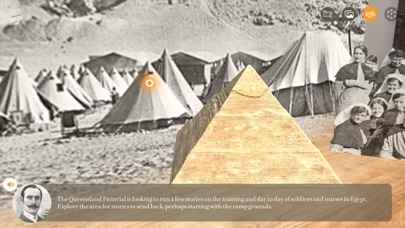
ANZAC Correspondent app for iPhone and iPad
Developer: Queensland Museum Network
First release : 03 Oct 2019
App size: 573.45 Mb
Step back in time to experience WWI through the eyes of an ANZAC war correspondent.
Augmented reality (AR) makes history come alive as you collect photographs and stories from Australians across battlefields in Egypt, Turkey and France. It’s history, captured by you.
* Transform the way you learn, see and understand the world around you through augmented reality.
* Use your smartphone or tablet as a vintage camera to capture photographs and learn stories from men and women on your journey across the battlefields.
* From the camps in Egypt and the fighting in Palestine, to the dangers of the Gallipoli campaign, follow the troops on the Western Front at Pozières, and report on the action in Villers-Bretonneux.
* Select your favourite photographs, stories and headlines to assemble your own downloadable newspaper articles.
* Discover bonus stories on your journey, and unlock a driving experience in the A7V tank Mephisto
For Teachers:
Use augmented reality to make history come alive, right here, in the classroom.
We collaborated with historians, teachers, and students to create ANZAC Correspondent, using AR technology to help younger generations feel connected to these stories.
An immersive and innovative experience means students are kept engaged for longer, and the intuitive navigation allows students to direct their own learning experience. Primary sources used within ANZAC Correspondent give insight into different historical perspectives and provide valuable opportunities for further research.
Implement ANZAC correspondent in your classroom today!
What students are saying:
“I like how there’s a storyline, how you go from Egypt to Gallipoli and then through to the western front. It’s pretty cool to be able to be in a familiar environment with all these things that you didn’t know popping up. Like the airplane! It’s normally just a roof and then there’s an airplane that you get to see. It’s pretty cool.” – Tom, Grade 10 Student Ormiston College
“I like how it took me to different places and told me about the different things the ANZACs did in the different locations. I think learning is a bit easier when it’s something different, and a bit more immersive, and it’s actually speaking to you, instead of just reading it from a textbook and answering some questions. My favourite part was travelling the different places and being able to see exactly what happened in those places and teaching us about it.” – Theo, Grade 10 Student
“I liked how it was really realistic, how you can move around – it felt really real. I liked how it took you all around where the Australians were involved, you could see key features of it and I found that really good to learn with.”– Sarah, Grade 10 Student
What teachers are saying:
“We’re working with the click generation, so I think the key difficulty we face is actually getting the kids to focus for long enough on something to digest it and to actually take the information in on a deeper level. We’re using augmented and virtual reality a lot more in our humanities classrooms and this is a fantastic example of that; where augmented reality can actually take the kids in to those historical settings and give them a digital, tactile experience of what it was like in those times and places.
The storyline is great, where there’s a range of different approaches the students can take within the storyline. Whilst there’s a clear pathway they can take, the way they move along that path is many and varied, which makes it a good option for using it with classrooms of students because they can have a range of experiences to talk about and discuss.
The use of the technology is an engaging way to get the students involved, but it’s also important in allowing them to create their perspective of history.” – Ian Burgess, Head of Humanities Department, Ormiston College


